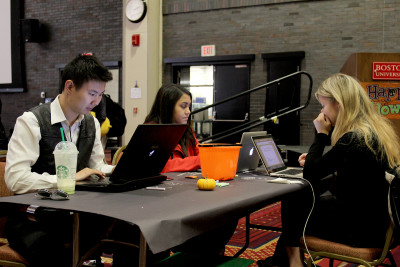
Boston University hosted 500 students from across the United States and Canada on Saturday and Sunday for the 24-hour tech-invention competition BostonHacks, where students from 25 different universities and colleges competed in teams of two to four to create “something awesome.”
Using state-of-the art technology, participants gathered at Metcalf Hall in the George Sherman Union to be judged under the categories of Funniest Hack, Best Design and Hack that “Just Works,” according to a release about the competition.
Major League Hacking Commissioner Nick Quinlan said the competition gives students the opportunity to create fresh technologies using more sophisticated gadgets provided by the MLH Hardware Lab.
“Students are given very, very little in the criteria in terms of what to build,” Quinlan said before the competition. “It can be pretty much anything just as long as they’re building it that day and haven’t built it beforehand.”
Quinlan said the competition allows participants to grow as individuals and hackers amid a supportive community.
“There are two really big reasons why we see a student want to start a hackathon at their school. One is to build that community at their school … to create a sense of community for developers and programmers,” he said. “It’s really cool to go into a room full of people and realize, ‘Wow, all of these people are interested in similar things to what I am, and they want to spend their weekend building something just like I do.’ That’s a really powerful feeling.”
In the opening hours of the competition Saturday afternoon, a calmness settled over Metcalf Hall, where students were adjusting to their surroundings by getting food and fueling up for the next 24 hours, while throwing around ideas with their fellow teammates.
At the end of the competition Sunday, participants presented their inventions to a panel of judges who evaluate their creations on five categories: originality, polish, technical difficulty, usefulness and presentation, the release stated. The judges included Wes Moran of the Wikimedia Foundation, BU computer science professor Mark Crovella and Doug Barron, vice president of applications at HubSpot.
Participants had a variety of ideas coming into the competition. Huai-Chun Shih, 25, a graduate student in the Metropolitan College, said he is working on an application that will prevent people from oversleeping.
“If someone oversleeps, they will be charged money, and other people can call this guy to wake him up and earn money,” he said. “Alarms don’t actually work very well because our brains get used to them. But if you talk to someone, your brain will wake up instantly.”
Other students embraced the Halloween spirit by incorporating the holiday into their inventions. Nick Maresco, 20, and Brian Tan, 21, students in the College of Engineering said their team is creating a responsive talking bear that changes its response based on its mood. It also features a scary Halloween theme.
“We’re working on an app-controlled ‘scare bear,’ and essentially what it’s going to do is it’s going to toggle [the bear’s] emotions in a really extreme way that’s controlled by the iPhone,” Maresco said.
Pratik Kagrana, a freshman from Purdue University, said he is working on an application to track a person’s blood alcohol concentration. Using a college as the associated scenario, Kagrana said, the application will allow users to be mindful of their alcohol intake.
“When you’re at a party and you’re having fun with your friends and you’re dancing and the music’s playing, you don’t keep track of how much alcohol you’ve been drinking so it kind of messes with your system,” Kagrana said. “[This application is] supposed to track alcohol so [users] can understand their blood alcohol content.”























































































































